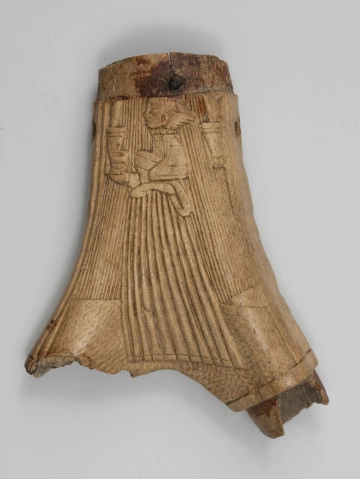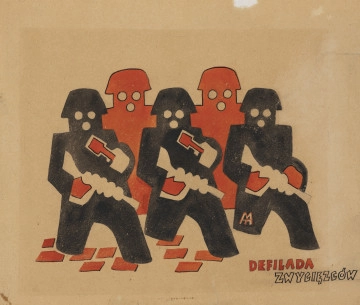
Powder box
1501 — 1600
National Museum in Szczecin
Part of the collection: Photographs from the collection of Halina Kamińska (Mamelok) née Baruch
A cabinet portrait photograph of seventeen-year-old Kazimierz Baruch (later Barliński) in a Polish uniform. A letter from this period survives, written by Baruch to his sister Halina, dated 25.09.1920, sent from Łódź probably to Warsaw or a suburb. In the letter (kept in the family archives), he ironically writes about one of his acquaintances who parades down Piotrkowska Street in a beautiful uniform, and with an equally beautiful dog and he wryly writes about the echoes of his glory. One can assume that this is an expression of his attitude to a particular person and his distancing himself from this type of behaviour in general. | Kazimierz Barliński initially stayed in Warsaw during the Second World War, and in March 1940, together with a group of other underground activists, he managed to get to the USSR. From oral information provided by his daughter Agnieszka Wróblewska during the preparation of the archival collection, it transpires that the Barliński family moved from Rozbrat Street to Kossaka Street in Żoliborz while Kazimierz Barliński was still in Warsaw. The family lived in the house in Żoliborz until the Warsaw Uprising without changing their surnames (they also survived the 1944 Uprising there, only to be expelled at the end, together with the rest of the civilian population). | On Christmas Eve 1942, the family received a letter from Kazimierz Barliński, who was staying in Samarkand, using the name Paweł Nowacki and fulfilling the function of a shop steward for the London government (the letter survived, it is in the family archive). Barliński-Nowacki was arrested by the NKVD shortly afterwards, in 1943. Feliks Mantel, who knew him, indicated in his memoirs that during passportisation he refused to accept Soviet citizenship and trace of him disappeared (Szkice pamiętnikarskie [Diary Sketches] in Zeszyty Historyczne [Historical Notebooks] 1965, b. 7, p. 111; Passportisation was the action of forcibly imposing Soviet citizenship on Poles who stayed on the territory of the USSR; the first such action began immediately after the annexation of the eastern territories of the Second Polish Republic in 1939. People who did not want to accept citizenship were imprisoned and sent to labour camps). | Mantel also recalled a meeting with Halina of Baruch: One of the first people I came across in Lublin was an elderly, distinguished lady who acted as a secretary to our department at the minister's disposal. I struck up a conversation with her while handling the mail and quickly established that she was Nowacki's sister, whose real name was Barliński (ibid., p. 111). | PK
Author / creator
Dimensions
cały obiekt: height: 13,5 cm, width: 8,7 cm
Object type
photograph
Technique
photograph
Material
paper
Creation time / dating
Creation / finding place
Owner
POLIN Museum of the History of Polish Jews
Identification number
Location / status

unknown
1501 — 1600
National Museum in Szczecin

Tomaszewski, Marian
między 1945 — 1947
National Museum in Szczecin

Komisarz Pożyczki Obrony Przeciwlotniczej na miasto Lwów (Lviv; 1939)
1939
Museum of the history of Polish Jews
DISCOVER this TOPIC
Museum of King Jan III's Palace at Wilanów
DISCOVER this PATH
Educational path
0/500

We use cookies to make it easier for you to use our website and for statistical purposes. You can manage cookies by changing the settings of your web browser. More information in the Privacy Policy.
We use cookies to make it easier for you to use our website and for statistical purposes. You can manage cookies by changing the settings of your web browser. More information in the Privacy Policy.
Manage cookies:
This type of cookies is necessary for the website to function. You can change your browser settings to block them, but then the website will not work properly.
WYMAGANE
They are used to measure user engagement and generate statistics about the website to better understand how it is used. If you block this type of cookies, we will not be able to collect information about the use of the website and we will not be able to monitor its performance.